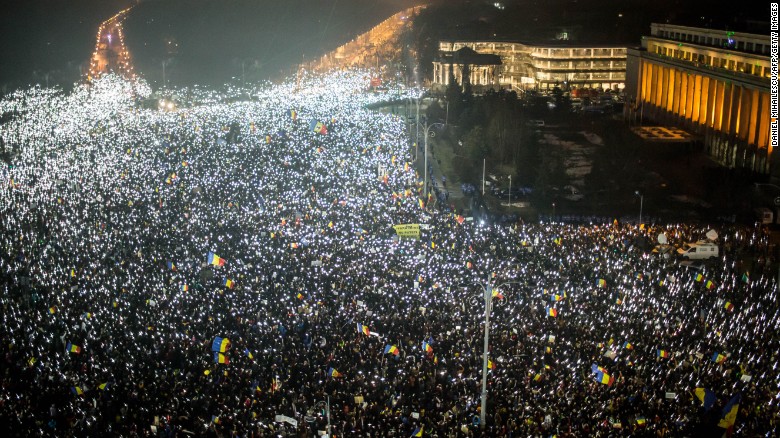Romania protests
February 7, 2017 | Expert Insights

Hundreds of thousands of Romanians are staging daily protests
On 5 February 2017, at least 500,000 demonstrators rallied across Romania, despite the government revoking a controversial decree that had fuelled their discontent. Sorin Grindeanu, the Romanian Prime Minister, announced on Sunday night that the government will “find a legal way” to withdraw decrees that protesters say will decriminalise and shield corruption.
An executive order that reduces penalties for abuse of power prompted hundreds of thousands of people across Romania to come out in protest, when it was adopted last Tuesday. The left-wing government earlier scrapped the bill, which would have shielded many politicians from prosecution for corruption. But protesters remain dissatisfied about a revised version of the bill which will be put to parliament.
A week ago, the government passed an emergency ordinance that would, among other things, decriminalise cases of official misconduct in which the financial damage is less than 200,000 Legal Entity Identifier. The government says the order and another draft bill on jail pardons are needed to ease prison overcrowding and bring the criminal code into line with recent constitutional court rulings.
The major concern is that the challenge might reverse in an anti-corruption push in Romania that saw the then Prime Minister Victor Ponta go on trial in 2015 over alleged tax evasion and money laundering – charges he denies. Prosecutors are currently investigating 2,150 cases of alleged abuse of power. The Romanian people fearing a repeat of Prime Minister’s Ponta reign have called for the current Social Democratic Parties government to be dissolved and a new one to be formed. They have remained on the streets and have lost faith in the government despite them rescinding the ordinance.
The protesters have so far managed to steer away the associations with opposition parties; they have a mixed demographic, and while some have used discriminatory language, blaming the poor for voting PSD, others reject such rhetoric. The remaining protesters face the daunting task of keeping up pressure on a government that will still try to reduce penalties for the corrupt. The good news is when governments tighten the screw, it inspires a wave of civic creativity. In many ways, this past, intense week was just the start.
Thousands march against prison pardons in Romania
The government is meeting today to work out how to withdraw the decree, which stipulates lesser punishments for some acts of corruption. The change to the law is now expected to go to parliament – which is dominated by the ruling Social Democrats (PSD), Grindeanu’s party.
The announcement is a step back by the PSD in the face of public pressure, expressed through street protest. This week’s demonstrations were the largest in Romania since the fall of communism in December 1989.
But yesterday protesters who had gathered in front of the government building in Piața Victoriei – Victoria Square – in Bucharest said they would still go ahead with demonstrations planned for today. They want to ensure that the order has no legal effect even if withdrawn (and so far, this doesn’t seem certain). Legislators are also supposed to be deciding on a separate PSD proposal that would free from jail those serving sentences of up to five years for offences including abuse of power.
These laws have been perceived by the protesters as a way to pardon and shorten the sentences of PSD politicians who have been convicted of corruption – or to clear the way for future abuses.
The head of the PSD and the government’s de facto leader is Liviu Dragnea, who is currently serving a suspended two-year jail sentence for vote-rigging, and is being prosecuted in a separate case for abuse of power. The proposed changes could allow Dragnea to become prime minister.








Comments